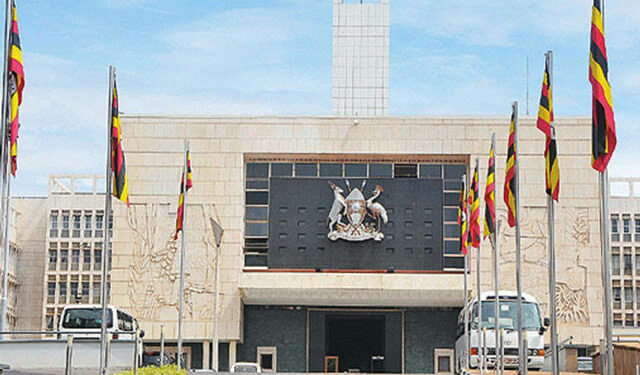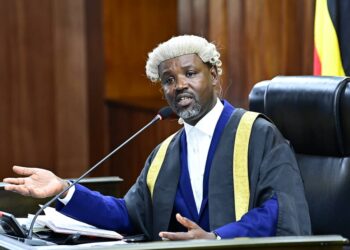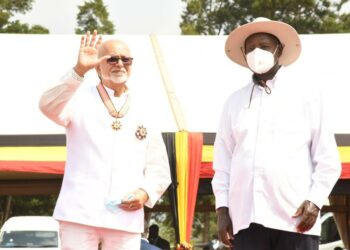In a powerful statement released today, Bobi Wine, the opposition leader and figurehead of the National Unity Platform (NUP), has emphatically clarified the nature of the #March2Parliament protests.
Contrary to the regime’s portrayal, the protests are not a product of NUP’s organization nor allays of any political party in the opposition but is a collective action whose chain links are formless and shapeless, no head, no body but it’s an invisible hand who power stems from the nuclear of technology, the social media.
Although Bobi Wine and his party have distanced themselves from being the organisers of the protest that has become a nightmare to the state, he has strongly said he is supporting the protest.
The #March2Parliament protests set to take place tomorrow 23rd July of this year have been framed by the current regime as a partisan initiative. Bobi Wine, however, denounces this characterization, asserting that the protests are a genuine expression of public outrage against systemic injustice, corruption, and misrule.
“Our stance is clear,” Bobi Wine declared. “The National Unity Platform is not the organizer of these protests, but we stand with the protestors. We are PeoplePower and firmly believe in the Power of the People. This is a movement led by the youth of Uganda, transcending age, religion, tribe, or political affiliation.”
According to Bobi Wine, the regime’s attempts to paint the protests as a partisan agenda are deliberate efforts to discredit the widespread dissatisfaction fueling these demonstrations. “The regime’s attempts to suppress and misrepresent the protests as a partisan issue are part of a broader strategy to weaken the true essence of this movement,” he stated. “But their efforts will fail.”
The protests, according to Bobi Wine, are not merely a display of political discontent but a cry from all corners of Ugandan society demanding accountability and reform. The outcry from the youth of Uganda reflects a broader dissatisfaction with the status quo, uniting diverse groups in a shared quest for justice.
Although the invisible powers behind this protest urge that the law book of the land gives the right to protest from Article 29(1)(d) every person has the right to “freedom to assemble and to demonstrate together with others peacefully and unarmed and to petition, the Police and Army plus the President have urged them that such rights must be exercised in a manner that does not infringe on the rights of others or disturb public order.
In his weekend address to the country, Gen Yoweri Kaguta Museveni warned that they will be “playing with fire” if they press ahead with plans to stage an anti-corruption march to parliament on Tuesday.
“We are busy producing wealth… and you here want to disturb us. You are playing with fire because we cannot allow you to disturb us,” he said. The president also accused some of the protest organisers of “always working with foreigners” to cause chaos in Uganda.
The Uganda Police Force have also for the second time warned the organizers whom they don’t know. “The Uganda Police Force (UPF) has clearly articulated its position regarding recent events,” stated the UPF spokesperson Rusoke Kituuma. “Such a mass occupation of the streets from the police perspective would likely result in significant traffic congestion, disruption of trade, and disturbances to public order.”
He added; “We reiterate our position that UPF shall not tolerate disorderly conduct,” Kituuma asserted. Our primary concern is the safety and well-being of all citizens, and we are committed to maintaining public order.”
Making Kampala City Akin to an Army Barrack Ahead of March to Parliament Protest
In anticipation of the March to Parliament protest scheduled for July 23rd, Kampala has been transformed into a virtual army barrack. The streets are now lined with military and police personnel, and checkpoints have sprung up across key locations in the city.
The authorities have ramped up security measures, citing the need to prevent potential disruptions and maintain public order. As a result, the once-bustling streets of Kampala are now marked by a heavy, visible presence of armed forces.
Security personnel have gained control of the roundabout at Busega, along the Kampala-Masaka route. There is no mistaking a police patrol truck and a large contingent of military soldiers at the Nateete traffic signals.
On every road that leads to the city centre, similar situations are playing out at intersections and roundabouts. In anticipation of the planned demonstration, security forces have set up tents on Constitutional Square, transforming the area into a makeshift barracks.
The National Unity Platform (NUP) offices in Bwaise, where the party was supposed to hold a press briefing, have been surrounded by combined army and police troops.
In response to worries about possible disruptions, police spokesperson Kituuma Rusoke discussed the additional deployment and said that the heightened security is a reaction. “A security concern has led us to deploy additional forces,” Kituuma said. We step up our security procedures when we have solid intelligence that particular actions could endanger public order, as we have done in this instance.
While officials argue that these measures are essential for ensuring safety, many residents are expressing concerns. The increased militarization of the city has led to an atmosphere of unease, with everyday activities being impacted by the stringent security protocols.
As the city braces for the protest, questions about the balance between maintaining order and respecting civil liberties loom large, leaving Kampala’s vibrant community grappling with the new, militarized reality.
Meanwhile, the protesters on Tuesday plan to take their march directly past Parliament, which they accuse of turning a blind eye to corruption. They view Parliament as a symbol of the corruption they are fighting against and believe that exposing it is a crucial step in their campaign for transparency and accountability.
“Our starting point in the fight against corruption is Parliament,” said Shamim Nambasa, a prominent protester. “We are determined to march past it because it represents the heart of the problem. The demonstration will proceed as planned, regardless of any opposition from the police.”
Do you have a story in your community or an opinion to share with us: Email us at editorial@watchdoguganda.com













